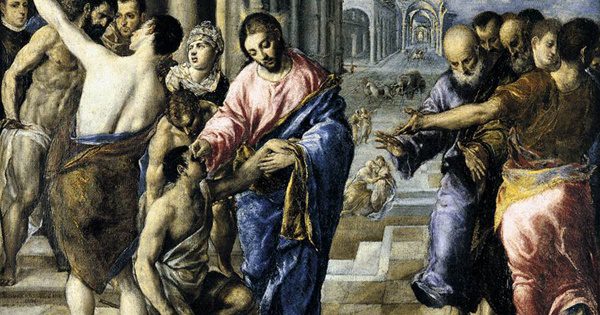June 18th, 2017
Matthew 9:35 to 10: 8
By Tom Truby and Bruce Prewer
DOING YOUR THING
Words often change meanings, or take on additional meaning over time. Take, for example, the word “thing.” “Thing” used to mean some object. Dad would say “get that thing over there” pointing to a screwdriver, a crescent wrench, a hammer or any number of other things all in the general direction he was pointing. He had the same problem I now have. He couldn’t think of the “things” precise name and he wanted it right now!
So a thing could be a fence post hidden in weeds. Careful! Don’t trip on that thing. Or a scoop shovel, “Here, take this thing and get busy. I’ve got to gas-up the tractor.” Or maybe “a thing” is a living creature as in “get that thing off me!” At country school my friend and I crawled through a culvert to emerge off the school property on the other side of the road. On one occasion he emerged with a bat attached to his shoulder. He didn’t know what it was but he knew he wanted “that thing” off him.
About 40 years ago the usage of the word “thing” broadened. “Thing” now became the word for a way of life, a belief, and a characteristic activity, as in “Doing my thing.” A parent might say “Go outdoors and do your thing somewhere else.” Or you might ask a friend not seen for twenty years, what have you been up to and they would answer, “Oh, just been doing my thing.”
Bruce Prewer remembers an older minister from about four decades ago who asked him: “Bruce, could you give me an English word that can be used instead of “thing” in the way kids use it today? My youngest daughter, Jane, was writing an essay last night. She asked me to check it. When I came upon her sentence, ‘Shakespeare had no equal, when it came do doing his thing.’ I commented: ‘You’ll have to do better than that. Find another word to replace “thing.” She retorted ‘What other word, Dad? You give me one.’ You know, Bruce, I was stumped. I cannot think of a mainstream equivalent in English. Can you.”
Well it got Bruce to thinking about THE JESUS THING. What was Jesus’ thing?
The Gospel of Matthew has a fine summary of the Jesus thing, at the end of chapter 9.
Jesus traveled among all the cities and villages, teaching in their synagogues, announcing the good news of the kingdom, and healing every disease and every sickness. Now when Jesus saw the crowds, he had compassion for them because they were troubled and helpless, like sheep without a shepherd.
In short, Jesus showed compassion. That was his thing. He allowed himself to feel with them. He permitted himself to feel pity for other people.
Did you know that pity and compassion were considered serious character faults in the Greek and Roman world? You were supposed to be hard and unbending and not moved by another’s pain. Did you know that the intellectual Greek spurned compassion as a crude regression into unenlightened human weakness and the Romans derided it as a flaw that would ruin a man’s dignity? But Jesus practiced compassion.
As I think about it, I remember struggling with this as a boy wanting to be a man. How do I fit compassion and manliness together?
In Nebraska, at least at our house, real men didn’t wear ear flaps unless it was below zero. Real men walked through mud puddles rather than around; after all, a straight line was the shortest distance between where you were and where you were going. Real men didn’t need other people, didn’t cry and never needed a Teddy Bear—never.
These were serious things I thought about as a little boy. There were so many feelings inside me swirling about and I had no idea what they were or how to express them. Later I wrote my doctoral dissertation on the question of manhood and dependence.
Jesus had compassion on the crowds that gathered around him, desperate for help and guidance. Those crowds remind me of our culture today. I think there is intense pressure now to forget human compassion and return to the ancient world of raw power and might makes right. I hope we will be able to hang on to our values.
Genuine compassion comes at a cost. It cost Jesus his life. Those who embrace compassion will share this part of “Jesus’ thing” too. Compassion costs us.
Yesterday at the Annual Conference I went to a workshop entitled “No Way to Treat a Child.” It was about the way the Israelis systematically detain, isolate and torture Palestinian children between the ages of 12-17 as a way of subduing the Palestinian culture in the West Bank, breaking international law. These are children just like ours. Good students, good kids, innocent; like any other 14, 15 or 16 year old. When these children return often after months of brutality, they are broken and angry; angry at the Israelis, angry at their parents for failing to protect them, and angry at life. Their parent’s hearts are broken too for they are powerless to do anything to protect them except plead with the international community to take notice. They know that it is our 3 billion dollars per year in aid to Israel that pays for it.
Compassion costs us. It broke my heart to see this and a part of me would rather not. But to see it increases our soul’s endurance, and as Paul said in the Epistle this morning, endurance produces character and character produces hope. This hope doesn’t put us to shame, because the love of God has been poured out in our hearts through the Holy Spirit, who has been given to us.” If facing “No Way to Treat Children” and responding gives me more of the heart of God then it’s worth enduring.
Immediately after Matthew summarizes the “Jesus thing” Jesus sends out the 12 disciples on their first mission. They are to go do “the Jesus thing” themselves; practicing the deeds of compassion displayed by their Master.
Here, for the first time in Matthew, the disciples are called apostles. Apostle means an emissary, a person sent out on a mission with the authority of the sender behind them. The disciples cannot stay at the point of being learners in the school of Christ. The time comes when the disciples must become the practitioners. They become the ambassadors of Christ Jesus.
The “marching orders” were not for each of them to “do their own thing” but to do the Jesus thing.
As you go, make this announcement: ‘The kingdom of heaven has come near.’ Heal the sick, raise the dead, cleans those with skin diseases, and throw out demons.”
I think the demons that need throwing out are all the ways we humans separate our humanity from the humanity of other people. Those Muslim children in Hebron are no different than our children. I could see that as I watched the video. I fell in love with them. My gut twisted, my manly reserve dissolved. I felt compassion and the desire to do something.
The spreading of this “Jesus thing” has never been easy. Some homes and towns and even some churches will always reject him. The message of Jesus never was and never will be universally popular in this world of arrogance, greed and delusion. Some may misunderstand “the Jesus thing,” others will understand it well enough to know that it threatens their way of life and they will find ways to oppose it.
Jesus told his apostles; Do your best, go to everyone in peace. But if they will not receive you, don’t take it personally, don’t entertain thoughts of revenge, shake the dust off your feet, let it go and you go elsewhere still free inside.
Sooner or later the apostles would be scorned and rejected, hounded and persecuted just as their Lord had been. There is an inevitable vulnerability for those who try to live with and for Jesus. For followers of Jesus, compassion turns out to be a manly thing for men and a courageous thing for women; not at all what the Romans and Greeks thought.
“Look, I am sending you as sheep among wolves. Therefore, be wise as snakes and innocent as doves.”
At this early point in Jesus’ ministry I think Jesus still hoped people would see their own need and come toward him. Most of them didn’t. His analysis of the human problem would need to deepen and he will come to see that if he really has compassion he will need to go to the cross. Only the cross will show humans what they do, that they are forgiven and that life beyond their poverty is possible. Thanks be to God.
















